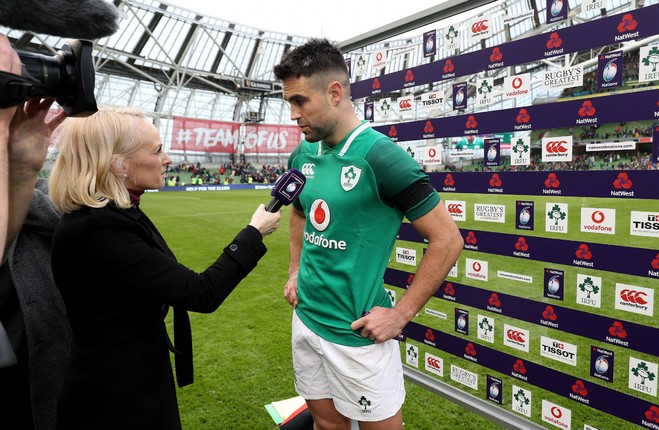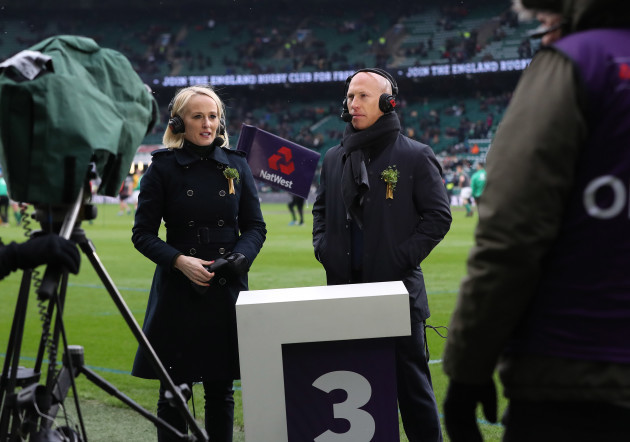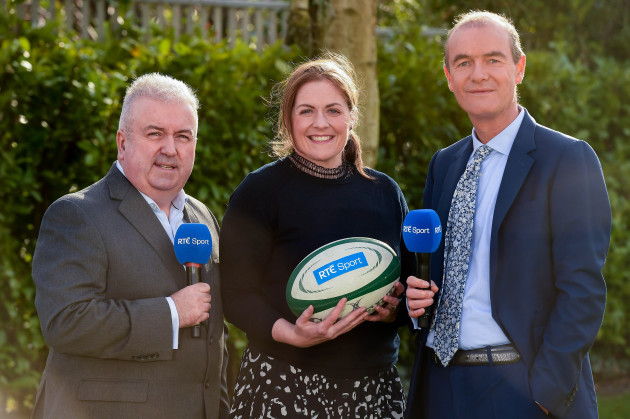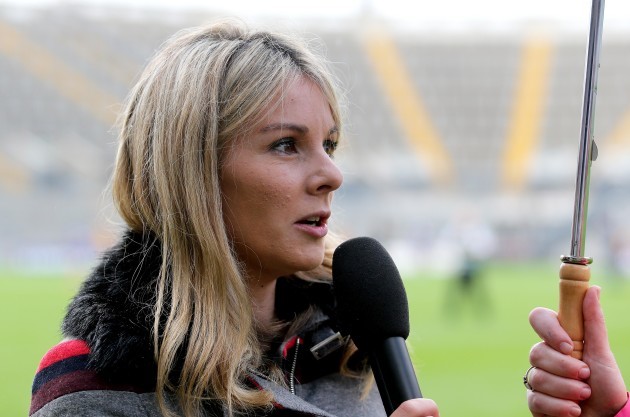SINÉAD KISSANE – Virgin Media rugby correspondent
Sinéad Kissane is walking down the tunnel at the Principality Stadium. This is 2006. Munster, the place she grew up in, the team who have suffered from bad luck and bad refs, have finally made it. Heineken Cup champions, at last. This is their big moment. And this is also Kissane’s.
Her story is the journalistic equivalent of Munster’s. Hard graft, a quiet self-belief, a break here, a break there. Now she is about to go live on air for TV3 and put words around the pictures of Munster’s big win. And suddenly the emotion of the day gets to her.
There’s only one word for it and it begins with s and ends in hit. So she walks back down the tunnel, round a corner, into a windowless corridor, gives herself a little pep talk and goes at it again. “Get yourself together here,” she says to herself. She did. Now, 14 years on, the lessons of that seismic day – in her career not just Munster’s history – have been absorbed.
It was my first time doing a Heineken Cup final live; first time Munster had won the trophy. So, yes, you wanted to deliver a sense of the occasion but you also have to get the balance right,” Kissane says. “You’re a reporter not a fan. No matter what you’ve got to have a sense of dedication to the job. There can’t be any mediocrity, it’s not acceptable.”
One of the highest profile female broadcasters in Ireland, Kissane worked her way up through the ranks, freelancing with TV3 and Newstalk before switching permanently from radio to television. Across 15 years with TV3, now Virgin Media, she has covered three World Cups and 15 Six Nations championships. Significantly, she has also just become the first female chairperson of the rugby writers of Ireland.
“When I first started out, I got the odd negative comment (about being a female reporter) but I’d have to say it was the encouragement of male colleagues that led to me becoming chair of the rugby writers,” she says. “You never hear anything derogatory now. And rightly so, there’s no place for that stuff.”
- All Six Nations matches will be screened live on Virgin Media One. Sinead Kissane also writes a column every Saturday for the Irish Independent.
FIONA COGHLAN, RTE
Fiona Coghlan’s phone rang. Mark McKenna, the RTE producer was on the line, asking if she was free to do co-commentary on the men’s Olympics Sevens from Rio. Coghlan’s immediate reaction was telling. “Who dropped out?” she asked.
The answer was no one. McKenna wanted Coghlan on air because she was the best person for the job. “Broadcasting is about being confident and taking opportunities when they arise,” she says. “Sometimes we are barriers to ourselves. Like, that was the case for me in 2016 when Mark offered me the chance. You have to put your best foot forward.”
She always did as a player, representing Ireland between 2003 and 2014, seeing the team move from ‘the dark days for women’s rugby’ into the light.
For years, there was nothing, no TV coverage, no consistency in press coverage. There was a big article in 2012 about our trip to play France way down in the south but the piece was more about the logistics of the journey rather than the fact we played really well and lost by a point.
“Things have definitely improved significantly in this respect. The fact the games are live on TV now is unbelievable. I am in a role I never thought was possible.”
She got there via RTE initially but more recently BT Sport have also taken her on board as a co-commentator. “I’m really honoured any time I am asked to do anything,” Coghlan says, “because it’s not my full-time job (she works as a Mathematics and PE teacher in Lucan Community College). So the fact my opinion is respected is great. Ten years ago, you wouldn’t have heard a woman analyst on TV at all.”
Last year was a big one, Coghlan working as a co-commentator for two of the World Cup quarter-finals – a breakthrough moment. “I didn’t see it that way. I was just doing a job.”
She did it extremely well – feedback from the public remaining largely positive.
“If I get something factually wrong and someone points that out to me, I’ll put my hand up and admit it.
I have no problem with someone not liking a commentator or an analyst. That happens. But don’t say I don’t like that woman commentator. You have to give a reason and be factual about it.”
- The entire women’s Six Nations championship will be broadcast on RTE 2
MARIE CROWE, RTE
This is how it started. They had a ford escort estate that was just about big enough to squeeze all nine of them – mum, dad and the seven children – in.
So, weekend after weekend, they wore out the roads in Clare, Tipp and Limerick, stopping off in these little parishes off the tourist routes. Different sports, same routine. Sandwiches packed, flask ready, rugby on a Saturday, GAA on a Sunday. If they weren’t playing it, they were watching it.
February and March were different, though. This was holiday season – not quite with the skis on the slopes of Saint Moritz or Chamonix – but still an adventure for seven young kids from east Clare. The Sandymount Hotel, adjacent to Lansdowne Road, roomed them all. Rugby was in the blood; Cornelius Crowe – their great, great grandfather won three Munster Senior Cup medals with Garryowen from 1893 to 1895. Tim, their father, was a selector alongside Declan Kidney on the Munster Schools’ side.
So getting a couple of tickets for Ireland’s Five Nations matches was easy enough. But scrapping around to get nine? Good luck with that. “Dad used to alternate his spare ticket between all of us,” – squad rotation invented before the term became fashionable. So, by the time college ended and her working life began, the question wasn’t what Marie Crowe would do for a living, but who she’d do it with.
Her initial break came at The Sunday Independent; her move into broadcasting arriving nine years later in 2014 with UTV Ireland, with whom she covered the 2015 Rugby World Cup. “A brilliant experience,” she says.
Better ones would follow. For the last six months, she has co-hosted Game On with Donncha O’Callaghan on RTE; ‘work-ons and learnings’ now a part of her every day conversations. And yet still she regularly has strangers ask if she’s actually into sport when she tells them what her profession is. “Like why else would we do it?” she asks.
Old perceptions die hard, though. Even though opportunities have improved for females in sports broadcasting, they’re still in the minority.
Someone has to break the glass ceilings – and for that to happen, it’s just so important that the next generation sees and hears us. You’d want to see more in print, too. How many female sports writers appeared in last Sunday’s newspapers? At a push, one.
“The key thing is for people to see females doing the job. In this respect, seeing Joanne Cantwell presenting Against the Head before she moved to the Sunday Game was crucial because when Joanne replaced Michael Lyster (as host of the Sunday Game), there was no suggestion it was because of her gender. It was purely and simply down to ability. That’s all you want.”
- Game On, presented by Donncha O’Callaghan and Marie Crowe is on RTE radio 2, weekdays from 6pm.
RUTH GORMAN, sports correspondent UTV
Ruth Gorman was bored out of her mind. Sitting in a computer lab, finishing off a week’s work experience, she hadn’t known tedium like this since a wet Wednesday as a kid when she was made sit through back-to-back episodes of Take the High Road.
Mild panic had set in. It was one thing knowing what she didn’t want to do for a living; another trying to figure out what she could do. “Pick a job you like,” she was told, “and you’ll never work a day in her life.”
That would be in sport. But no sooner had she cleared one hurdle, when another appeared. Saturdays ceased to be her own, mornings spent reporting on hockey for Radio Ulster, afternoons on football for UTV and then on the evening shift at the Sunday Life.
Being a female working in sport, you had to graft for it a wee bit more,” she says. “Early on in my career, a couple of Irish League soccer managers didn’t speak to me on camera. They’d do other television interviews but wouldn’t do one for me – and I don’t know why. Maybe it was because they thought ‘this girl just wants to be on TV’. But it couldn’t have been further from the truth. I was a young reporter but serious about my work. After about a year, it changed. They realised then I knew what I was talking about.”
If football and hockey provided the initial entry points into broadcasting, then rugby – her primary passion – soon took over. She has reported from three World Cups and 10 Six Nations championships. Down the line, she’d like to give match commentary a go – while more broadly speaking she has big ambitions for women’s sport. “You’d hope a time will come when it’s covered in the same vein,” she says. “We’re some way off that now but we’re getting there.”




